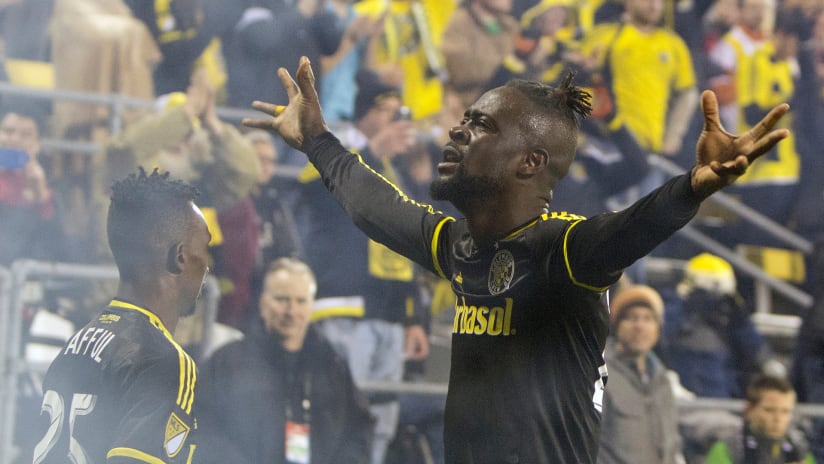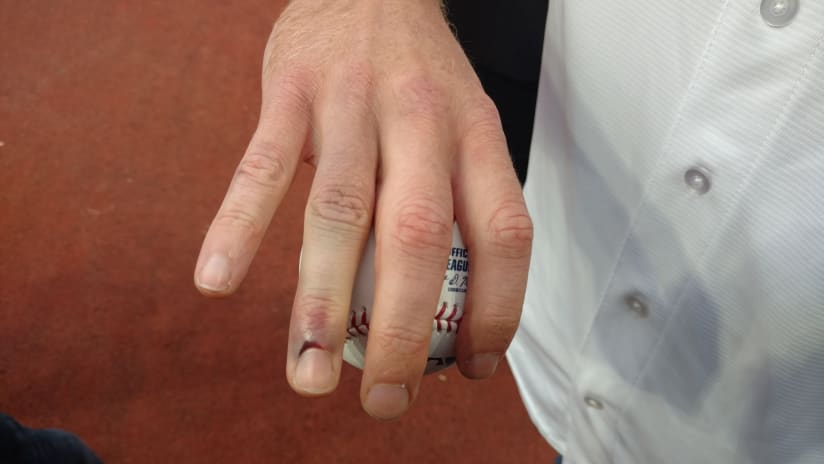Table of Contents
The Moment the Season Ended
Redemption
Mr. Numbers Nerd: Game One Loss Edition
The Other Side of Drogba
Top Five For Sure
Have you recovered from Sunday yet? To call Columbus Crew SC’s 3-1 extra-time win over the Montreal Impact to win the Eastern Conference semifinal series 4-3 on aggregate an emotional roller coaster would diminish the stature of actual rollercoasters and emotions. How could they compare?
Looking back at this game, I’m not sure I even know where to start, so let’s start with the nadir— the point where I was convinced the season was over.
The 2015 Crew SC season ended in the 68th minute. Moments earlier, Ethan Finlay had cut in front of Montreal defender Laurent Ciman as Ciman attempted to dribble of out the Impact’s penalty area. With Finlay now between Ciman and the ball, the Montreal defender put both hands on Finlay’s shoulders and dragged him down to get him out of the way. The referee pointed to the penalty spot. Columbus had a golden opportunity to take a 2-1 lead in the game and to knot the series at 3-3. The season appeared to be saved.
“He’s very confident trying to come out of the back there and he tried to play a ball around me,” Finlay said of Ciman. “I put my body in front of him and he put his hands on me and also got the back of my leg there. I actually wasn’t a hundred percent that I was in the box. I knew it was going to be a foul in a good spot for us, but when he pointed to the spot for us, it was justice.”
What followed was calamity. Federico Higuain appeared poised to take the penalty kick, but was talked off by Kei Kamara. Higuain had long been the automatic go-to guy, but struggled from the spot this year, and Kamara had been tabbed as the designated penalty taker during the stretch run as he chased the Golden Boot for the most goals in the regular season.
“It was up to them to figure it out,” Crew SC Sporting Director and Head Coach Gregg Berhalter said. “I think they’re both able penalty takers and looking at who felt better at the moment, they could decide who to take it.”
Kamara calling off Higuain made sense on those levels, and it’s not truly an apples-to-apples comparison, but it nevertheless ominously echoed back to Tony Sanneh taking the ball from Jeff Cunningham—a guy who knew a thing or 134 about scoring goals—before another potentially season-saving penalty kick in the 2004 playoffs. Any playoff penalty switcheroo is apparently going to recall that trauma.
When Columbus won MLS Cup in 2008, I thought such feelings of dread had been eradicated forever. I had seen my team win it all. Everything is not destined to end in agonizing failure. But man, seven years is a long time. And I’m from Cleveland. It doesn’t take much to get those innate instincts up and running again. As Kamara lined up for his penalty kick, all I could think about was Tony Sanneh and the sense that everyone in the stadium was doomed.
And of course, Kamara’s hesitant penalty was saved by Montreal goalkeeper Evan Bush. It wasn’t as feeble as Sanneh’s infamous attempt, but it was a poor penalty kick nonetheless.
So that’s how the 2015 Crew SC season was going to end. Montreal would win the series because of a missed offside call on Dilly Duka’s goal and because the Ghost of Sanneh haunted MAPFRE Stadium after 11 years, like some kind of sadistic specter-cicada.
Unbelievable. This after a year in which the Cavaliers lost both Kevin Love and Kyrie Irving in the playoffs while still almost winning the NBA title without them. Oh what could have been. This after a year in which the Indians were picked to win the World Series by Sports Illustrated and then staged a furious late-season rally to finish 81-80 while missing the playoffs entirely. This after a year in which the Browns destroyed their proud legacy with garish new uniforms, accompanied by their usual awful record. This after the highly-touted Blue Jackets started the season with an eight-game losing streak. And now this. A promising Crew SC campaign was going to end like THIS.
All I could think about is how much I hate sports. I love my teams, but man, do I hate sports.
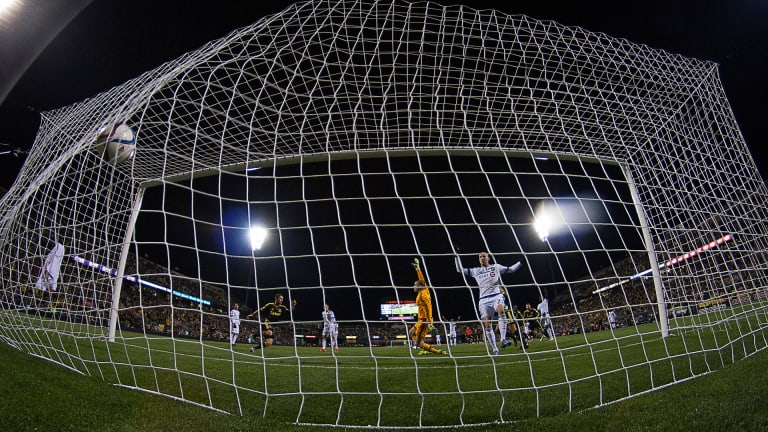
The babbling above is one of the reasons I never would have made it as a professional athlete. It’s one of a bajillion reasons, but a reason nonetheless. What ultimately saved the 2015 Crew SC season was thinking diametrically opposed to my own in that moment.
The team as a whole displayed a lot of resiliency, but the season-saving goal scorers are the most prominently illustrative.
As Ethan Finlay stood at his locker, he admitted that he didn’t have a good two-game series. Not exactly an earth-shattering admission, but Finlay is never one to shy away from the bad along with the good. Over the course of the two games, his touch frequently got away from him, or his crosses didn’t find their targets, or his shots lacked danger. He was almost invisible in game one, and while he may not have been at the top of his game on Sunday, he still found a way to change the game. Coaches love to say that the only thing you can truly control is your effort and your attitude. Finlay is the embodiment of that. The guy put up Donovan-esque numbers in 2015, and while a lot of that is speed and skill, a lot if it is also effort and attitude.
Finlay nearly saved the season when he drew the penalty call on Ciman. That was nothing but an effort play. He could have let Ciman waltz out of the back, but he did the work to make life difficult and it resulted in a golden opportunity to tie the game. It didn’t work out, but Finlay never let up.
He tied the game in the 78th minute. It was as easy a goal as he will score. He just had to bang a loose ball into the roof of an open net from the six yard box. But that goal doesn’t happen if he doesn’t stay involved in the play. When Cedrick Mabwati crossed the ball to Jack McInerney, and when Jack Mac hit a low shot that forced a rebound from the save, it was Finlay’s commitment to the far post run that resulted in the goal. It was an effort goal. Nothing more, nothing less. (Well, “season-saving” too.)
“(Montreal’s Donny) Toia had a fantastic two-game series against me,” Finlay said. “I talked to him and I said that he played great. It was difficult. For me, it was just continue to keep going. Continue to keep going. I don’t think I had a great two legs, but my biggest thing is always affecting the game. Tonight, to get on the end of a ball, you know you make a lot of back post runs and it might not come to you nine of out of ten times, but the time that it does, you need to be Johnny on the spot. I was, and I was happy to be able to finish it.”
In extra time, Finlay would play a role in the series-winning goal. He collected the ball along the right sideline at midfield. 13 seconds of weaving later, he still had the ball on his feet, a long way from where he had started. He was just outside the box on the left side of the field, laying a ball off to Cedrick Mabwati in the left channel. Mabwati took on his defender one on one and served a far-post cross that Kei Kamara looped under the cross bar and inside the post for the goal that would win the series.
For Kamara, the goal erased the trauma of the missed penalty. So much so that he feigned total ignorance when asked about it afterward.
“What penalty?” he said with a laugh.
Finlay noted that missing the penalty could have derailed many a player. But not Kamara.
“Kei… a lot of guys are out of the game,” Finlay said. “They are done right there if they miss a penalty in that kind of a moment. He stuck in it and he responded with the game-winner.”
Was it hard for Kamara to put the potentially calamitous missed penalty out of his mind?
“Now it is,” he said, “but it’s tough because usually when that happens, for every striker, you think about it for a little bit but they tell you to have a really short memory. Sometimes you miss goals, you miss stuff. I hit the crossbar - that could’ve went in. But it was planned for the game to go to overtime and it wasn’t as fun if we don’t push it to overtime and the crowd getting their money worth so that was good.”
The resiliency goes beyond Finlay and Kamara. How about Michael Parkhurst rebounding from a tough play that led to Montreal’s game-winner in the first leg to put in a stellar performance in game two? Or bench guys like Mabwati and McInerney making an immediate impact? Or the team as a whole gutting their way through so many stomach-churning moments over the course of 210 minutes, with the season hanging in the balance on every single play?
“Character, resiliency, and just battling when the chips were down,” Trapp said. “That’s what you want.”
And to be clear, that doesn’t mean it will always pay off. Finlay playing defense on Ciman may not result in a penalty. His back post run may not result in the ball falling to him for a goal. Kamara’s header may have glanced off the crossbar and bounded away. It wouldn’t have changed their effort in the face of adversity, but few of us would have noticed. All we’d be talking about is an offside goal and a missed penalty.
But now we’re talking about a thrilling and dramatic win. It’s a win that wouldn’t have happened if guys went in the tank after things didn’t go their way. Sometimes effort in the face of adversity pays off. This was one of those glorious instances, and it was Massive.
MR. NUMBERS NERD: GAME ONE LOSS EDITION
It’s always fun when a team has done something that has never been done before in club history. For example, this 2015 Crew SC team became the first in club history to have five different players tally at least five goals and five assists. On Sunday, this year’s Black & Gold added another first to their resume—they became the first Columbus team to ever advance after losing the first game of a multi-game playoff series. Until 2015, a game one loss was a harbinger of doom. Columbus went on to be eliminated all nine times that the Black & Gold tasted defeat in the first game of a multi-game series.
1996 Eastern Conference semifinals
First game: Lost 2-0 vs. Tampa Bay
Series: Lost two games to one.
1997 Eastern Conference finals
First game: Lost 3-2 at D.C. United
Series: Lost two games to zero.
1998 Eastern Conference finals
First game: Lost 2-0 at D.C. United
Series: Lost two games to one.
1999 Eastern Conference finals
First game: Lost 2-1 at D.C. United
Series: Lost two games to one.
2001 MLS Cup quarterfinals
First game: Lost 3-1 vs. San Jose
Series: Lost two games to zero.
2004 Eastern Conference semifinals
First game: Lost 1-0 at New England
Series: Lost 2-1 on aggregate
2009 Eastern Conference semifinals
First game: Lost 1-0 at Salt Lake
Series: Lost 4-2 on aggregate
2010 Eastern Conference semifinals
First game: Lost 1-0 at Colorado
Series: Tied 2-2 on aggregate, lost in PKs
2014 Eastern Conference semifinals
First game: Lost 4-2 vs. New England
Series: Lost 7-3 on aggregate
2015 Eastern Conference semifinals
First game: Lost 2-1 at Montreal
Series: WON 4-3 on aggregate
When Gregg Berhalter claimed that he and the team were satisfied with the result in Montreal, it raised a lot of eyebrows. It’s hard for most people to imagine being satisfied with a playoff defeat, but Berhalter felt his team did not lack confidence heading into the home leg. Crew SC came out on fire, grabbing a 1-0 lead and having several opportunities to blow the game wide open in the first half hour.
“Well what I’d ask you is to look at the start of the (second) game and think if we’re at all not confident or at all insecure about who we are as a team,” he said. “You can see we’re up for it and we know we are a good team and when we play like that, we are a very hard team to play against.”
In making that “satisfied” comment after the first leg, Berhalter also took the long view of the series, knowing that an away goal could be a crucial asset.
“We approached these two games as one 180-minute game plus overtime if needed, and it was managing those 180 minutes plus the extra 30 minutes, and I think we did that really well,” he said. “We got criticism from you guys [the media] about the first game. You want us to go in there and beat them 3-0 in Montreal. I think this group has high expectations set on them but we felt like the objective was fulfilled in Montreal and we came back in front of our home crowd and wanted to put on a good show and win a game and we did that.”
For the players, winning the series after dropping the first game was proof of how far they had come since last year’s debacle against New England, where a 4-2 home loss in the first leg obliterated the series before it even started.
“Last year, after our first game, it was pretty much out of reach,” said Wil Trapp. “We kept it within reach (in Montreal) and coming home, we’re a difficult team to beat at home, especially after a crowd like we had tonight. They were incredible. But yeah, the degree of maturity and the degree of pragmatism was really good to see. We were really happy with it.”
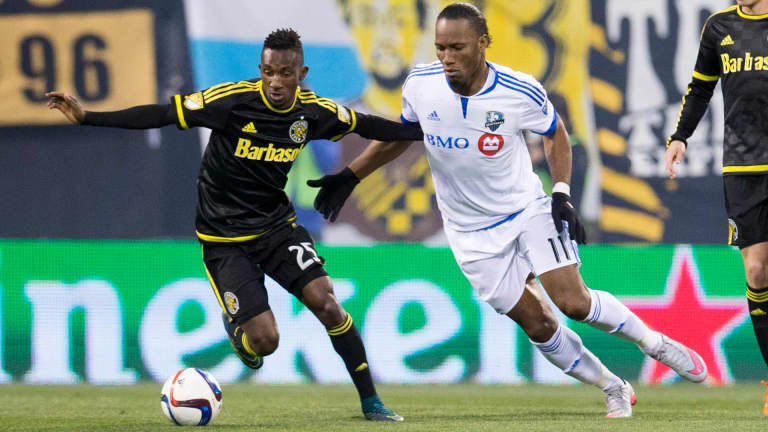
It didn’t take long for Didier Drogba to immediately become one of the most reviled villains in Columbus sports. The Chelsea legend spent most of the series lying on the ground writhing in agony, and in the rare instances he was upright, he gingerly hobbled about like Fred Sanford. Well, except for when he needed to make a play. Then he was as fast, strong, and skilled as one would expect a legendary player of his caliber to be.
During the first leg in Montreal, Drogba cleaned out Crew SC goalkeeper Steve Clark with a slide tackle, then when Clark tried to stand up, Drogba clamped onto his leg like an oversized koala on a eucalyptus branch. Between the tackle and the leg clamp, what Drogba did was worse than anything Cleveland Cavaliers guard Matthew Dellavedova did during the 2015 NBA playoffs. But since Delly is a bench guy, the narrative was that he was a reckless player going out of his way to endanger careers through childish gamesmanship, whereas Drogba is a legend, so the Clark incident was, like, totally LOL. Or something.
On Sunday, Columbus fans spoofed the famous “Drogba Legend” banner from his Chelsea days with a “Drogba Leglock” banner. The stadium booed every time he touched the ball. The Nordecke had a few choice words for him in chant form every time he whined to the referee or fell to the ground as if all the bones in his legs had spontaneously shattered into toothpick-sized fragments.
In the end, Columbus fans got the better end of it. Crew SC advanced and Drogba was held scoreless in consecutive games for the first time in his MLS career. The villain had been vanquished. Good riddance.
But then there’s the other side of the story. Apart from his being a legend at Chelsea, and apart from what I saw in this series, I don’t know much about Didier Drogba. I know he’s a superstar and all that, but I don’t watch the Premier League often, so I know him mainly through name recognition and what I saw in November of 2015. I’m sure that makes me a terrible soccer fan, but whatever.
Anyway, like most Crew SC fans, I saw Drogba as an infuriating villain. Over the course of 210 minutes, I came to loathe the guy as an opponent.
Then came the moments where that wasn’t the case. He’s an aggravating opponent to be sure, and he deserved all the boos he got on the field, but I love those times in life where you see a different side and it changes your perception.
After not speaking to the press, Didier Drogba, international sooperdooperstar, could have showered, popped on some giant headphones, hopped on the bus (or an ambulance to the nearest shattered skeleton reassembly center), and never thought of Columbus again until next year. But that’s not what happened. I didn’t see this, but Patrick Guldan of Massive Report tweeted that Drogba, along with Nigel Reo-Coker, sought out Berhalter to offer their congratulations on advancing and to praise Crew SC’s style of play.
Meanwhile, inside the locker room, Kei Kamara spoke of a postgame chat and jersey swap with Drogba.
“He’s still a legend to me,” Kamara said. “I got his top after the game. He gave me some advice and all that. Just being on the field with him, it’s amazing. It’s a dream, so I cherished it…”
Drogba wasn’t finished. As Kamara wrapped up interviews, Drogba sent a Montreal reporter into the Crew SC locker room to tell Kamara that Drogba was waiting outside and wanted to speak with him some more. Kamara made his way outside and the two resumed their conversation. TV cameras rushed to record the West African striker summit, but Drogba waved them off and told them it wasn’t about that. Crew SC Director of Communications Tim Miller then formed a one-man security shield so the two men could talk to each other in peace for another several minutes before Drogba had to get on the bus.
I’m not saying not to boo Drogba the next time he sets foot on the MAPFRE Stadium pitch. His actions on the field earn every boo he gets from the fans. But on Sunday night, I was delighted to be reminded that there is world of difference between being a villain and playing a villain.
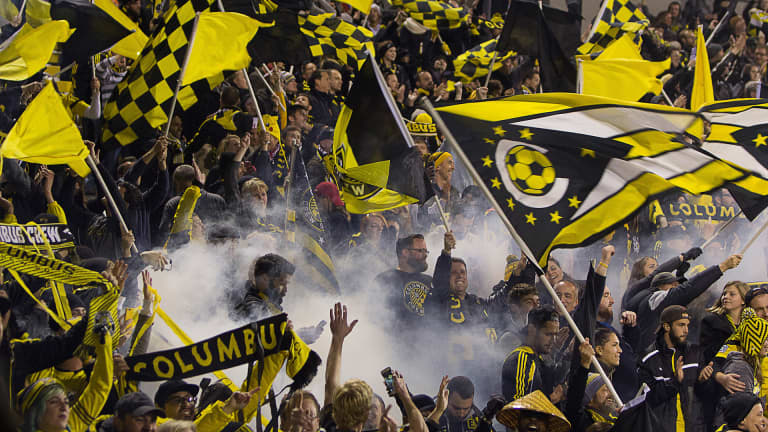
One of the things I really enjoy about Crew SC President of Business Operations Andy Loughnane is that he likes learning about the history of the club. In an interview with Massive Report earlier this year, I talked about how history and the present/future need to co-exist. History without hope for the present or future diminishes that history by making it wistful. The present without a sense of history robs the present of any sense of context. Every time I see Andy, it seems like he is seeking out that context. He isn’t just some beancounting business guy. He’s passionately engaged with the club.
This week he wanted to know where Sunday ranked in terms of the greatest and most emotional home wins ever. He knew it was special, but he wanted context as to how special. He immediately recognized that the 2008 Eastern Conference Final win over Chicago was going to be #1, but he wanted to know if the Montreal win cracked the top five.
I’m going to have to go with a resounding yes. In fact, I think I would place it second behind only the 2008 Fire playoff game. There may have been games that were more fun. There may have been games with higher historical significance, like the opening of the stadium in 1999. But wow, in terms of stomach-churning, mood-swinging, season-on-the-line drama punctuated by delirious elation, this one is almost impossible to top. Almost.
Two other games I seriously considered were the two-goal comeback against Kansas City in the 2002 Lamar Hunt U.S. Open Cup semifinal and the 1-0 win over the LA Galaxy in the 2002 Lamar Hunt U.S. Open Cup final. Those were huge (and dramatic) results on the field, but the crowds were small, which hurts them when making a comparison about how the event felt. Sunday’s crowd was large and loud. Every emotion was amplified 19,026 times, which made it that much more draining and joyous.
It’s going to be difficult to ever unseat that Chicago game from the top spot, but it won’t be impossible. Winning MLS Cup at MAPFRE Stadium is a hypothetical event that could do the trick, and it is currently mathematically possible for December 6, 2015. Tickets have already gone on sale to Crew SC season ticket members in case Columbus and Portland advance to the championship game.
But before that could even be a possibility, another challenge awaits, not only for the players, but for the fans. The Black & Gold are going to need all the help they can get against the 2015 Supporters’ Shield champion New York Red Bulls in the 2015 Eastern Conference Finals. Another large crowd can hopefully help the team make more top-five memories. Kamara credited the energy of the fans for pushing them over the hump against Montreal.
After Ethan Finlay called Sunday’s crowd all he had hoped for and more, he thought about how the fans got their money’s worth and how much it meant to the team. To him, it almost seemed impossible to think that someone could experience Sunday and not immediately buy tickets to do it again on November 22.
Finlay said, “If you don’t come back for the next one, I can’t help you there.”
Unless you’re beyond help, I look forward to seeing (and hearing) all of you on November 22 at 5:00 p.m. Let’s do it all again. Especially the winning part.
Questions? Comments? Going to need every second of that recovery week that MLS built into the playoff schedule? Feel free to write at sirk65@yahoo.com or via twitter @stevesirk.
